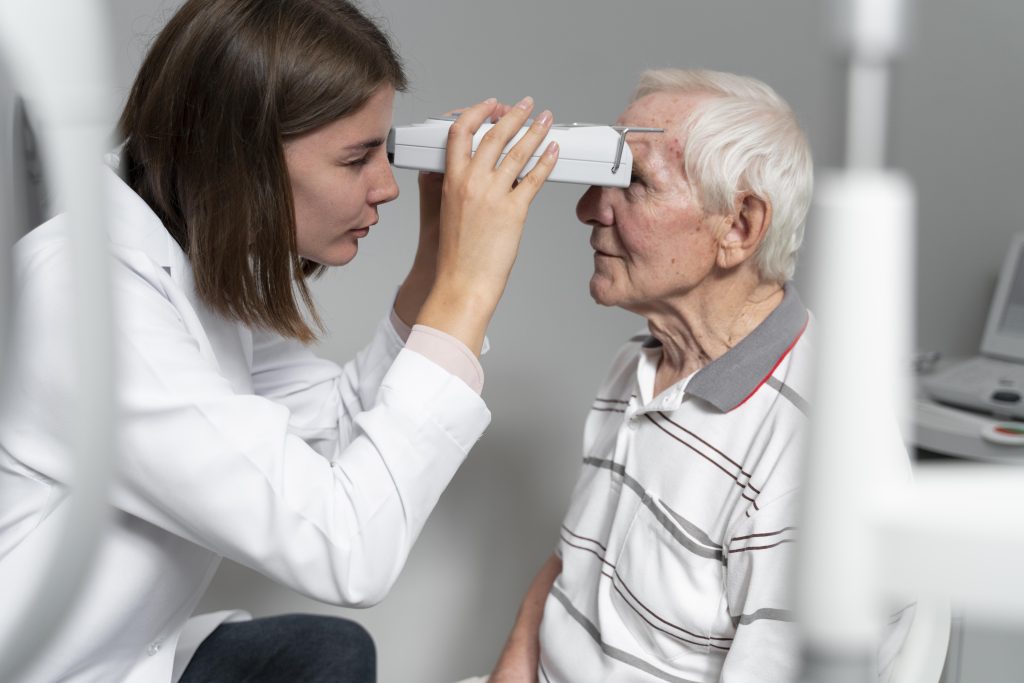Ear infection are a common ailment that many people experience at some point in their lives. They can cause much discomfort. If not treated, they can lead to serious health issues. One question that often arises is whether an ear infection can spread to the eyes in adults. Understanding the link between ear and eye infections can help prevent problems. It also can ensure effective treatment.
Understanding Ear Infection
Ear infections occur when bacteria or viruses infect the ear. This often happens when fluid builds up in the middle ear, creating a breeding ground for germs. Ear infections have common symptoms. These include ear pain, trouble hearing, fever, and fluid drainage from the ear. Children get ear infections more often. This is due to their smaller eustachian tubes. But, adults can also suffer from these infections. Ear infections in adults can be tough. They may show health issues or weak immune systems.
Understanding Eye Infections
Eye infections, like conjunctivitis (pink eye), can come from bacteria, viruses, or allergies. Symptoms typically include red or pink eyes, discharge, itching, pain, and swollen eyelids. These infections can be highly contagious and uncomfortable, making prompt treatment essential. Adults may also get eye infections. These can be due to the environment, contact lens use, or health conditions.
The Connection Between Ear and Eye Infections
Though it might seem unlikely, there is a potential connection between ear and eye infections. The ear, nose, and throat are connected. These channels include the eustachian tubes and the nasolacrimal ducts. These channels can spread infections. Understanding these links is crucial. They show how an infection in one area can affect another.
How Can an Ear Infection Spread to the Eyes?
Anatomical Pathways:
The ear and eye are connected through the eustachian tubes and nasal passages. If an infection travels through these pathways, it can potentially affect both areas. For example, an ear infection could cause sinus congestion. This congestion might lead to an eye infection if the germs spread through the nose. Also, these structures are close. So, inflammation in one can easily affect another.
Immune System Response:
When your body fights an infection, nearby tissues can have inflammation. They can also have immune responses. This means an infection in one area, like the ear, can cause immune system reactions. These reactions might affect the eyes, especially if the infection is severe or persistent. The body’s inflammation can spread to nearby areas. This can lead to complications in the eyes.
Hygiene and Contagion:
Poor hygiene or touching the infected ear and then the eye can also spread bacteria or viruses. It’s crucial to wash your hands frequently and avoid touching your face to prevent the spread of infections. Cross-contamination happens through everyday actions. For example, rubbing your eyes after touching your ear can spread germs.
Symptoms to Watch For
If you have an ear infection and start to notice symptoms in your eyes, it’s important to seek medical advice. Symptoms that could indicate an eye infection include:
- Red or pink eye
- Eye discharge
- Swelling around the eye
- Itching or pain in the eye
- Blurred vision
- Sensitivity to light
Preventing the Spread of Infections
Maintain Good Hygiene:
Wash your hands regularly with soap and water. Avoid touching your face, especially your eyes and ears, to reduce the risk of spreading germs. Using hand sanitizers when soap and water are not available can also be effective. They help maintain hygiene.
Prompt Treatment:
Treat ear infections promptly and thoroughly. Follow your doctor’s advice. Finish all prescribed medications. Even if you start to feel better, finish them. This ensures the infection is fully killed. It also lowers the risk of it coming back or spreading.
Stay Hydrated and Healthy:
Drinking lots of water and eating well can help your immune system. It fights infections. Adequate hydration helps in maintaining mucous membranes and preventing infections from settling in.
Avoid Contagion:
If you or someone in your household has an infection, avoid sharing personal items. These include towels, pillows, and eye makeup. These items can easily transfer bacteria or viruses from one person to another. Regularly disinfect commonly touched surfaces to minimize the risk of spreading infections.
Treatment Options
Antibiotics:
For bacterial infections, antibiotics are often prescribed. These can help clear up the infection and prevent it from spreading. Always use antibiotics as directed by a healthcare professional to avoid resistance.
Osteopathic Treatments:
Osteopathic treatments can provide a holistic approach to managing infections. Gentle manipulations can improve drainage and blood flow. They aid in recovery. Osteopathy looks at the whole body. It ensures that all possible causes of the infection are addressed.
Home Remedies:
Warm compresses, over-the-counter pain relievers, and staying hydrated can ease symptoms. They also help recovery. Home remedies can give quick relief. You can use them while waiting for targeted treatments to work.
Consult a Healthcare Provider:
Always consult a healthcare provider for proper diagnosis and treatment. Self-diagnosis and treatment can lead to complications. A professional can provide a custom treatment plan. It will address your condition’s specific needs.
Conclusion
An ear infection can spread to your eyes. Understanding the connection and taking preventive steps can greatly lower this risk. Good hygiene, getting prompt treatment, and following your provider’s advice are key. They prevent complications. If you have eye infection symptoms and an ear infection, seek medical advice. This will ensure both conditions are treated well.
Taking care of your ears and eyes is crucial for overall health and well-being. Stay informed and proactive. You can prevent infection spread and keep your health. Good care and timely treatment can help avoid problems. They also ensure a fast recovery.
Schedule an Appointment with DeptFord Medical Center
If you are experiencing symptoms of an ear or eye infection, don’t wait to seek help. At Deptford Medical Center, our team is experienced. They are dedicated to providing care that is both comprehensive and compassionate. We offer a range of treatments, from conventional medicine to holistic approaches, tailored to meet your specific needs.
Contact us today to schedule an appointment and ensure your ear and eye health is in expert hands. Our friendly staff is ready to help you. They can offer fast and effective treatments. Your health and well-being are our top priorities at DeptFord Medical Center.
FAQs about Ear and Eye Infection
What are common symptoms of an ear infection?
Common symptoms include ear pain and difficulty hearing. They also include fever and fluid drainage from the ear. In adults, ear infections may also cause dizziness or a sense of fullness in the ear.
Can an Ear Infection Cause Runny Nose and Eyes?
Ear infection often coincide with runny noses and watery eyes in New Jersey, especially when linked to sinus congestion or seasonal allergies. For instance, bacterial ear infections (like those caused by Streptococcus pneumoniae) can inflame nasal passages, triggering post-nasal drip and eye irritation.
NJ’s fluctuating weather—such as sudden cold snaps in Newark or summer humidity along the Delaware River—exacerbates these symptoms by swelling mucous membranes. To manage this triad of ear, nose, and eye issues:
- Use saline nasal sprays (available at NJ pharmacies) to flush allergens.
- Apply warm compresses to the ears and sinuses to reduce pressure.
- Try antihistamines like Claritin during NJ’s April–June tree pollen surge.
If symptoms persist beyond 3 days, consult a NJ ENT specialist to address underlying infections or allergy triggers like mold spores common in older Paterson homes.
What should I do if I experience symptoms of both ear and eye infections?
Seek medical advice immediately. A healthcare provider’s proper diagnosis and treatment can prevent complications. They also ensure both infections are treated well.
Are eye infections contagious?
Yes, many eye infections, such as conjunctivitis (pinkeye), are highly contagious. Avoid touching your eyes, wash your hands frequently, and do not share personal items to prevent spreading the infection.
Can an Ear Infection Affect the Eyes?
Ear infection can directly impact eye health in New Jersey due to shared nerve pathways and fluid drainage systems. Inflammation from a severe ear infection (e.g., otitis media) may spread to the eyes via the trigeminal nerve, leading to redness, dryness, or blurred vision.
What treatments are available for ear and eye infection?
Treatments include antibiotics for bacteria. They also include osteopathic manipulations to improve drainage and blood flow. And home remedies can help with symptoms. Always follow your healthcare provider’s recommendations.
Can an Ear Infection Cause Gunky Eyes?
Yes, ear infection can lead to “gunky” eye discharge (medically called ocular discharge) in New Jersey residents, particularly when allergies or sinusitis are involved. The eustachian tubes and nasolacrimal ducts—pathways connecting the ears, nose, and eyes—allow bacteria or viruses from a middle ear infection to spread.

